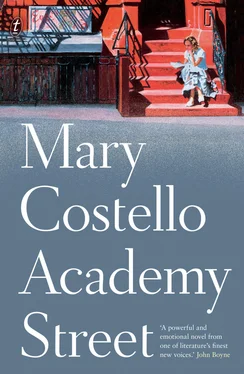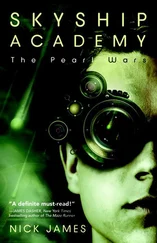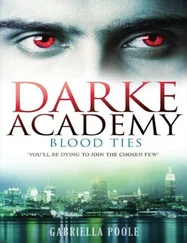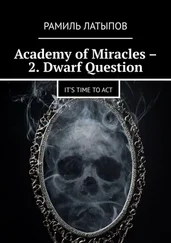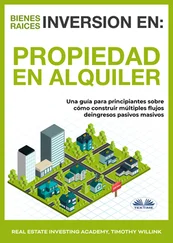Mary Costello - Academy Street
Здесь есть возможность читать онлайн «Mary Costello - Academy Street» весь текст электронной книги совершенно бесплатно (целиком полную версию без сокращений). В некоторых случаях можно слушать аудио, скачать через торрент в формате fb2 и присутствует краткое содержание. Год выпуска: 2014, Издательство: Text Publishing Company, Жанр: Современная проза, на английском языке. Описание произведения, (предисловие) а так же отзывы посетителей доступны на портале библиотеки ЛибКат.
- Название:Academy Street
- Автор:
- Издательство:Text Publishing Company
- Жанр:
- Год:2014
- ISBN:нет данных
- Рейтинг книги:3 / 5. Голосов: 1
-
Избранное:Добавить в избранное
- Отзывы:
-
Ваша оценка:
- 60
- 1
- 2
- 3
- 4
- 5
Academy Street: краткое содержание, описание и аннотация
Предлагаем к чтению аннотацию, описание, краткое содержание или предисловие (зависит от того, что написал сам автор книги «Academy Street»). Если вы не нашли необходимую информацию о книге — напишите в комментариях, мы постараемся отыскать её.
J.M. Coetzee
Academy Street This is an intimate story about unexpected gifts and unbearable losses, and the perpetual ache for belonging. It is exquisitely written and profoundly moving.
Academy Street — читать онлайн бесплатно полную книгу (весь текст) целиком
Ниже представлен текст книги, разбитый по страницам. Система сохранения места последней прочитанной страницы, позволяет с удобством читать онлайн бесплатно книгу «Academy Street», без необходимости каждый раз заново искать на чём Вы остановились. Поставьте закладку, и сможете в любой момент перейти на страницу, на которой закончили чтение.
Интервал:
Закладка:
On Good Friday in the ward she received a call from the front desk telling her she had visitors downstairs. Molly and Fritz were waiting in chairs and when she saw them her heart lurched. Molly rose, came towards her, her face crumbling. ‘She’s gone, Tess. Claire is gone.’
That afternoon, she accompanied two elderly patients to the hospital chapel for the gospel readings of the Passion. A choir and a small orchestra performed Bach. Once, as a child, she had fainted in the packed church during the long Good Friday readings. Claire, or Evelyn perhaps, had carried her outside, her bottom lip bleeding from the fall, and put her down on the grass. She remembered coming to, the sun, the light. She had felt resurrected. Now she stood for the long reading. Peter denies Christ three times, the cock crows. The musicians played the opening chorus, and it took hold of her and she was brought down by the terror, the torment, the fury. Peter’s anguish. Herr, Herr, Herr. She sat, stricken. The priest began again, and she was there by the cross with the men, the weeping women. She felt the crown of thorns, the sword piercing his side. She closed her eyes to the serene music, the sorrow in the soloist’s voice, the last still note. She became bereft. She was with Christ on Calvary, with Claire in Gethsemane. ‘It is finished,’ he said. And he bowed his head and gave up his spirit.
That night she went up on the roof and lit a cigarette. The sounds of the city rose and fused into one deep hum in her ears. She inhaled deeply and the nicotine spiked her lungs. Lighted windows surrounded her, eyes watching her in the dark. She stood in the centre and turned, dizzy from the nicotine. Above her, an unbounded sky, infinite, too much to behold. Her grief was as large as the sky. How had it come to this? She lay down on the roof and curled up and Claire’s face came to mind. All her faculties, her senses, were quiet now. In a few days she would be laid to rest, side by side with strangers, under a Californian sun. What these months must have cost her. The small girl, the boy, presented to her one last time, unable to raise a hand to touch their heads, groping for words through wasted muscles and withered vocal chords. The sound of their play later in the day drifting up from the back yard, while indifferent angels sat and stared as she faded out in a darkened room, fighting off Heaven until Heaven won and she vanished.
She heard a thud. She raised her head, scanned the rooftop. She was alone. She peered into the corner and saw the door, closed. She jumped up, ran, saw that the plank of wood used to prop it open had been kicked away. The janitor had come, locked up for the night. She flung herself at the steel door, pounded her fists, called out his name. Blind with panic she picked up the plank and lashed it against the metal, then paused, listened out for a voice or footsteps inside. She ran across the rooftop to the west wall, the east wall, the north and south, back and forth until the space in between increased with each crossing. She leaned over, called down eight stories to the street below. She searched other rooftops, windows, for faces, the image of Theo in his cot three floors below tormenting her. Over and back she ran, calling out until her voice grew hoarse and tears came. She slid down against the wall, pulled her cardigan tight around her, and began to pray.
Above her the sky was a vault. Stars looked down on the whole round earth. She felt herself remote. She was staring into emptiness. In the dark and deepening shades she divined a cry. She felt the child stir and his eyelids flicker, and every breath, every minute sound, reached her distinctly. She held her own breath and his cry came again from within her, loud and soft, hypnotising her, twisting, circling, echoing from ear to ear inside her head. Shh, go back to sleep. His eyes opening, registering the room, the light shining in from the hall. His small arms starting to free themselves, raising a thumb to his mouth. For a while he lay still, alert for any sound, then rose from under the covers, held onto the bars of the cot. Shh, shh , she whispered. She strained to reach him. He started to whimper, then paused, listened. She was not coming. He began to sob. The sob became a cry, and the cry a howl. His howls pierced her. She summoned every power and willed him near her.
Exhausted, he threw himself down on the covers, his cheeks flushed and tear-stained, his little fists yielding. Shh, Rock-a-bye baby . She hummed, whispered, strove until there existed a perfect consonance between his breath and hers, his heart and hers. Hours passed. The chill of the night entered her bones.
She stirred. Cold and stiff, she tried to rise. The whole building listed, tilted in the night, and she swayed and slid back down. She drew up her knees. She wished she were made of stone. She peered at a narrow gap, black, between the roof boards, and her mind slipped in, bored a hole down into the dark, a channel through the heart of the building to where the child lay. She poured herself in. Falling, falling. Walls pressing against her. Coffin walls, quarry walls. Orchard walls. Well walls.
All night long she drifted in and out of dreams, visions, prayers. At dawn the sun broke over the rooftops, and the city stirred. She heard the clang of metal and the steel door fell open. To the west a plane rose slowly, climbed into the sky.
11
THE CHILD’S EXISTENCE turned a plain world to riches. Her life raised up like this, the child giving point and purpose to each day, the care of him transforming her, widening and deepening her.
Something else, too, accrued. Everywhere her heart softened towards mankind. The minor irritations — the slow strollers on the pavement at rush hour, a broken elevator, a long line in a café—were shed. A tenderness entered her actions, a softness in her tone of voice. She found unbearable a raised voice, a blaring horn, a rough hand on a patient. She saw vulnerability everywhere — old women in shopping aisles, the bums and drunks and hobos on the subway, the blind, the lame, the stray dogs — the voiceless and defenceless on every corner. One day she stopped before a broken branch on the pavement and when she looked up the bare wound on the bough grieved her.
A small circle of people attached to her life — Willa, Molly and Fritz, a few colleagues, and at a further remove, the Irish families in her building. She saw Anne Beckett only once, before Anne and her husband returned to Ireland. Neither of them mentioned the child — there was no need, they were unlikely to meet again. Tess wrote to Claire’s husband in California and offered to have the children visit. His reply, when it came, was polite but non-committal, and between the lines Tess found the hint of a new love. She thought of the boy and girl in the years to come, imagining their lives, in a house with a new mother, on a beach with a new brother.
It was with Willa she was most herself. With Willa she found an affinity that she did not find with her colleagues or with the other mothers in her building. It had existed from the start, this understanding. She saw how Willa treated people, her ease with children — how she mollified them — and from her example Tess learned how to be a mother. She noted the patience and grace with which Willa conducted herself when subjected to racial barbs and insults, sometimes inflicted by Tess’s own compatriots. She was in thrall to Willa’s life too, to her appetite for life, her freedom, the order she brought. Her apartment was warm, noisy, full of cooking smells and chatter and arguments and Willa at the heart of it. Tess tried to emulate her ways but an air of quietude seemed to hang in her own rooms always, as if something vital was missing.
Читать дальшеИнтервал:
Закладка:
Похожие книги на «Academy Street»
Представляем Вашему вниманию похожие книги на «Academy Street» списком для выбора. Мы отобрали схожую по названию и смыслу литературу в надежде предоставить читателям больше вариантов отыскать новые, интересные, ещё непрочитанные произведения.
Обсуждение, отзывы о книге «Academy Street» и просто собственные мнения читателей. Оставьте ваши комментарии, напишите, что Вы думаете о произведении, его смысле или главных героях. Укажите что конкретно понравилось, а что нет, и почему Вы так считаете.
